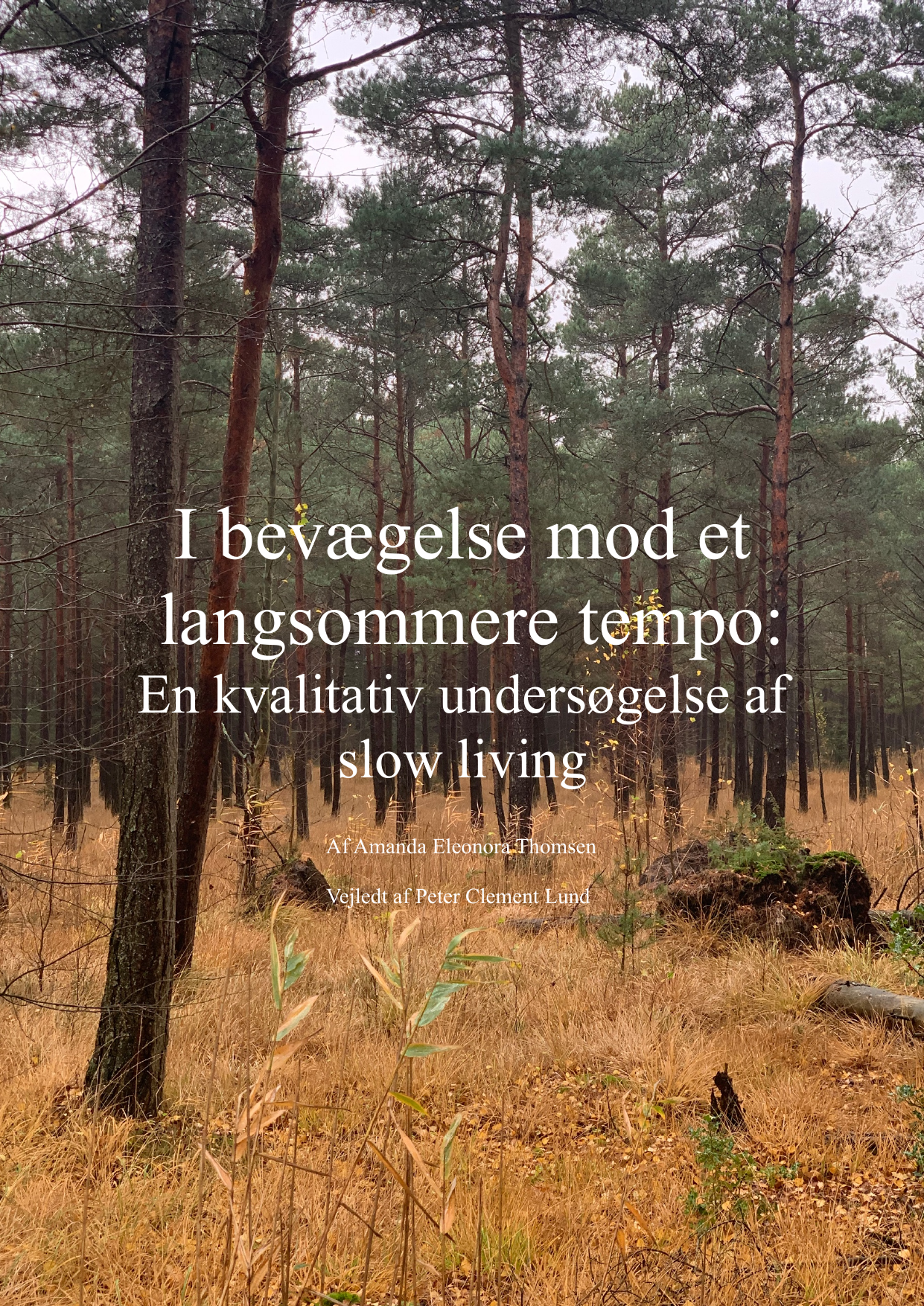
I bevægelse mod et langsommere tempo: En kvalitativ undersøgelse af slow living
Oversat titel
Moving Towards a Slower Pace: A Qualitative Study of Slow Living
Forfatter
Semester
4. semester
Uddannelse
Udgivelsesår
2025
Afleveret
2025-05-29
Antal sider
65
Abstract
In recent years, a social debate in Denmark has unfolded concerning lifestyle choices that challenge prevailing societal norms. In particular, the lifestyle slow living has gained increasing attention and is regarded as a counterresponse to the accelerating pace of modern society. Despite the growing interest, the phenomenon of slow living remains underexplored within the research field of psychology. This master’s thesis explores the phenomenon of slow living and its impact on the individuals’ well-being. The aim of this paper is to investigate how individuals’ turn toward a slow living life-style can be understood, and how this lifestyle influences the individuals’ well-being. To investigate this, a qualitative research design was applied using Interpretative Phe-nomenological Analysis (IPA), a method grounded in phenomenology and hermeneu-tics. Semi-structured interviews were conducted with four women in their mid- to late twenties, all of whom have made a lifestyle change toward slow living. The interviews were transcribed and analyzed using IPA. Three themes emerged: The busy and effi-cient life, A transitional phase between lifestyles, and An everyday life characterized by a slower pace and time for introspection. The analysis was elucidated by theoretical perspectives of Hartmut Rosa, Byung-Chul Han and George Herbert Mead. The main findings indicate that the participants turned to slow living as a response to psychologi-cal distress and mental illness. The distress was rooted in an everyday life characterized by acceleration, performance pressure, a fast pace, and time-optimization. For several participants, this lifestyle led to a breaking point where it became psychologically un-sustainable to maintain such a pace. Through a reflective transition phase, the partici-pants began to question their previous way of living and connect with their inner needs. Furthermore, the findings indicate that adopting to the slow living lifestyle brought an increased sense of well-being, including improved sleep, enhanced emo-tional awareness, reduced psychological distress, and an increased sense of happiness and hopefulness. However, participants also encountered challenges in adapting to slow living, such as skepticism from close relations and periods of doubt and uncer-tainty about the future. While these findings contribute new insights to a relatively un-derexplored research field, further research is needed on individuals’ experiences with slow living in order to gain a deeper understanding of the phenomenon.
In recent years, a social debate in Denmark has unfolded concerning lifestyle choices that challenge prevailing societal norms. In particular, the lifestyle slow living has gained increasing attention and is regarded as a counterresponse to the accelerating pace of modern society. Despite the growing interest, the phenomenon of slow living remains underexplored within the research field of psychology. This master’s thesis explores the phenomenon of slow living and its impact on the individuals’ well-being. The aim of this paper is to investigate how individuals’ turn toward a slow living life-style can be understood, and how this lifestyle influences the individuals’ well-being. To investigate this, a qualitative research design was applied using Interpretative Phe-nomenological Analysis (IPA), a method grounded in phenomenology and hermeneu-tics. Semi-structured interviews were conducted with four women in their mid- to late twenties, all of whom have made a lifestyle change toward slow living. The interviews were transcribed and analyzed using IPA. Three themes emerged: The busy and effi-cient life, A transitional phase between lifestyles, and An everyday life characterized by a slower pace and time for introspection. The analysis was elucidated by theoretical perspectives of Hartmut Rosa, Byung-Chul Han and George Herbert Mead. The main findings indicate that the participants turned to slow living as a response to psychologi-cal distress and mental illness. The distress was rooted in an everyday life characterized by acceleration, performance pressure, a fast pace, and time-optimization. For several participants, this lifestyle led to a breaking point where it became psychologically un-sustainable to maintain such a pace. Through a reflective transition phase, the partici-pants began to question their previous way of living and connect with their inner needs. Furthermore, the findings indicate that adopting to the slow living lifestyle brought an increased sense of well-being, including improved sleep, enhanced emo-tional awareness, reduced psychological distress, and an increased sense of happiness and hopefulness. However, participants also encountered challenges in adapting to slow living, such as skepticism from close relations and periods of doubt and uncer-tainty about the future. While these findings contribute new insights to a relatively un-derexplored research field, further research is needed on individuals’ experiences with slow living in order to gain a deeper understanding of the phenomenon.
Emneord
